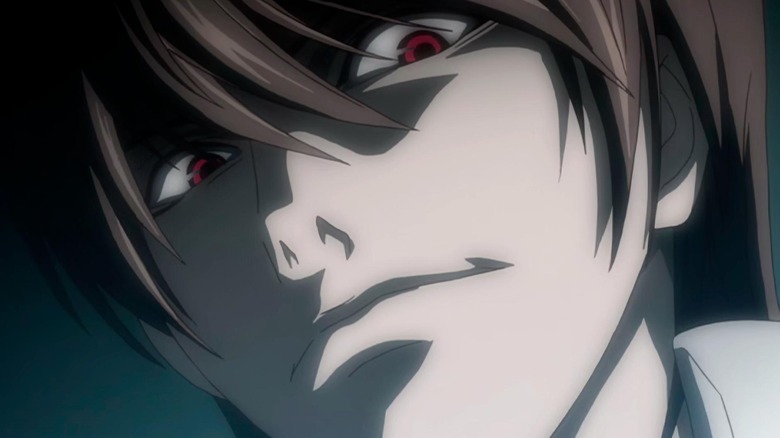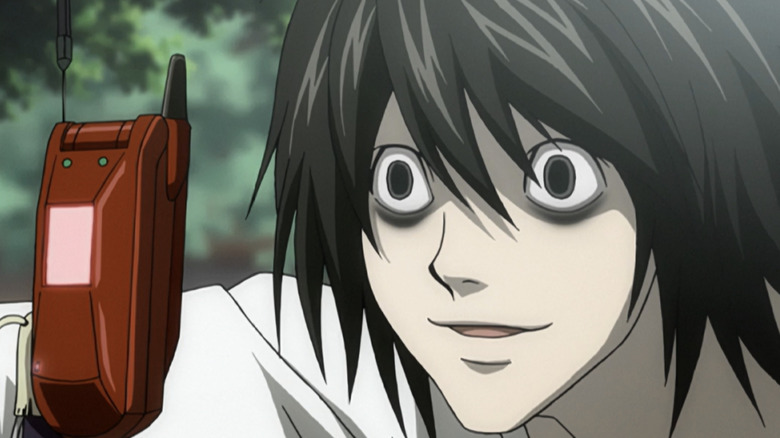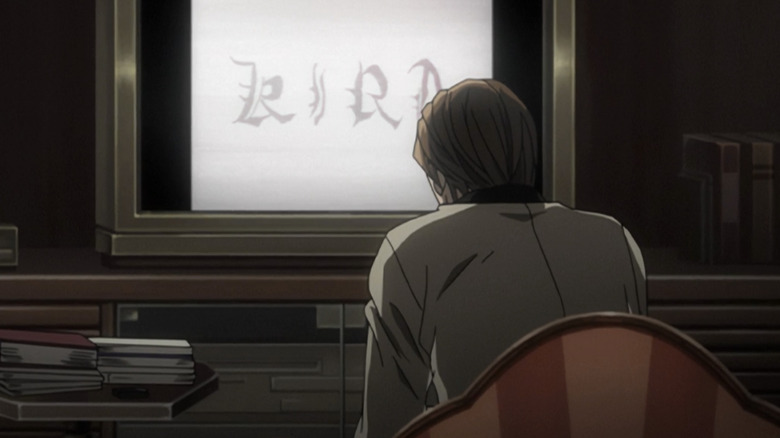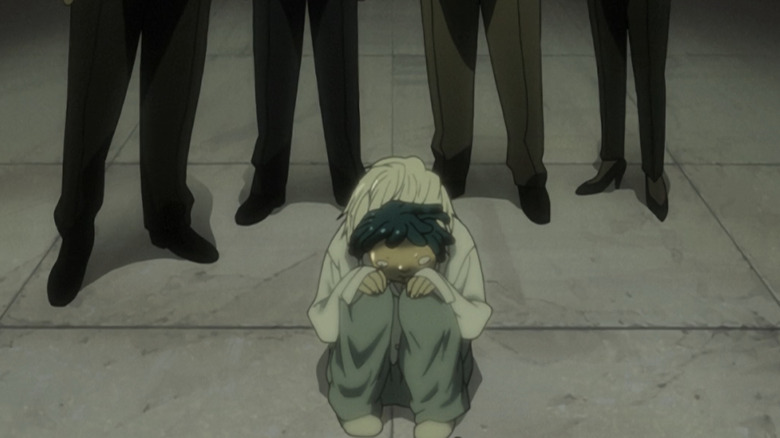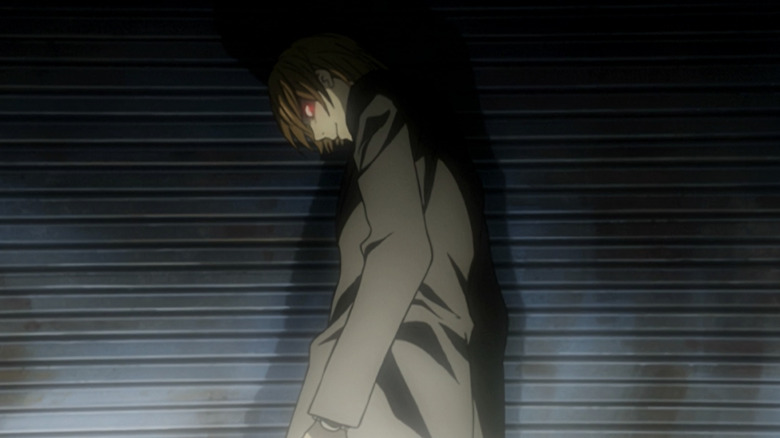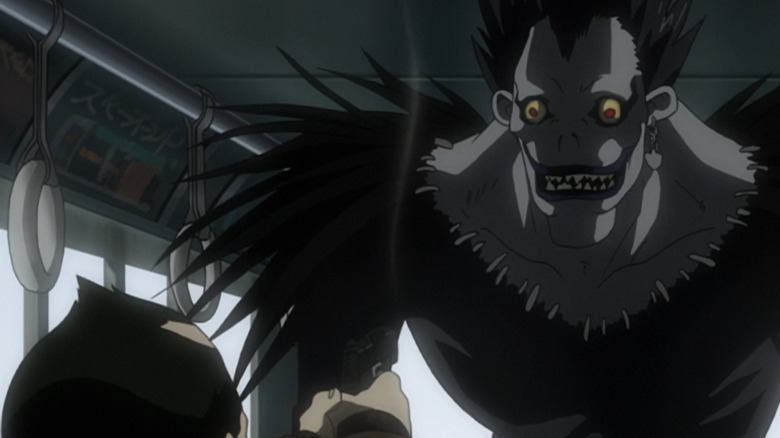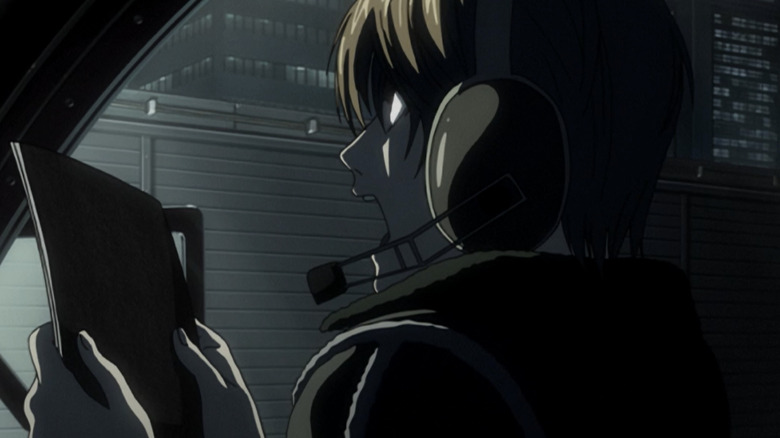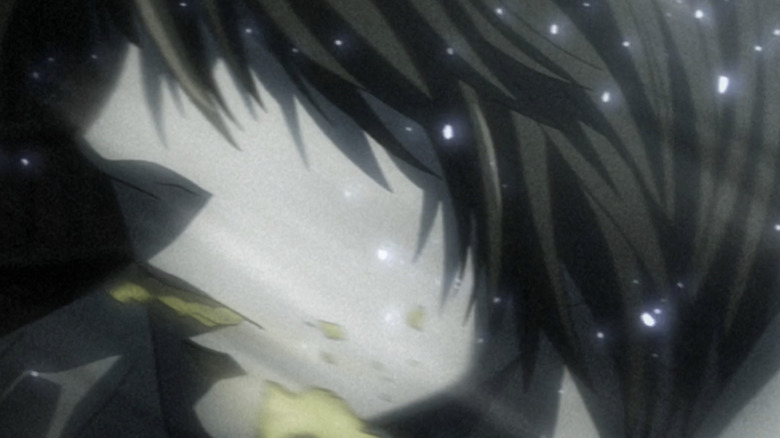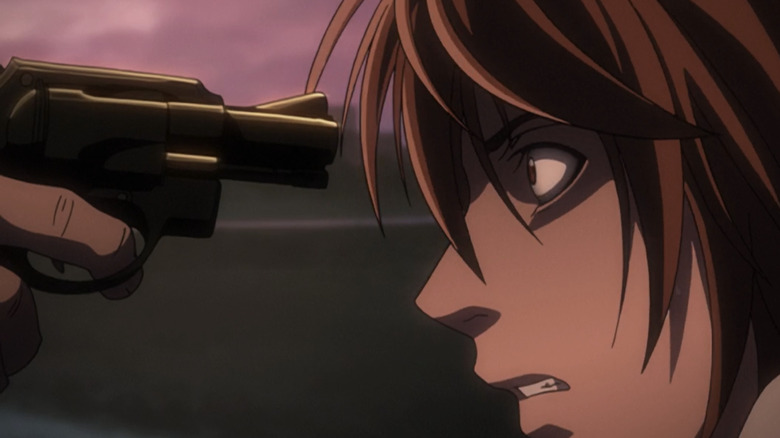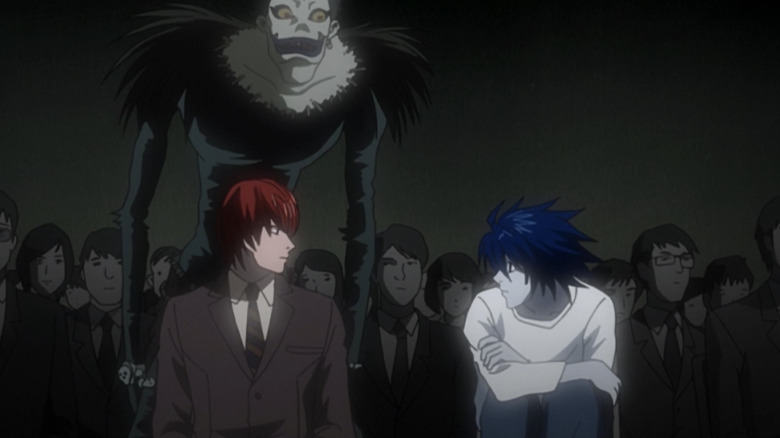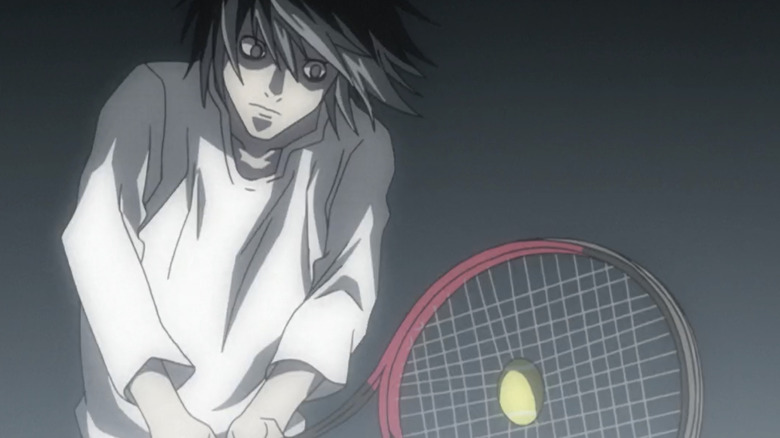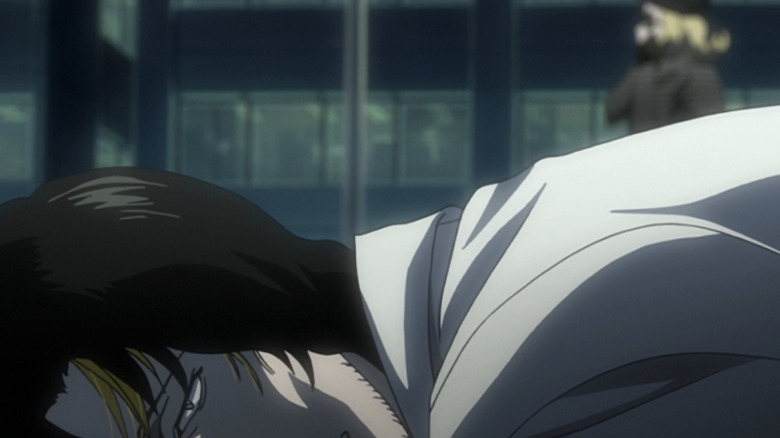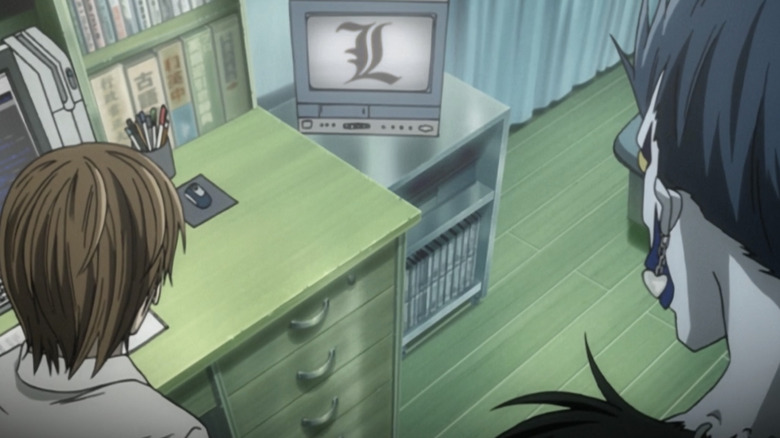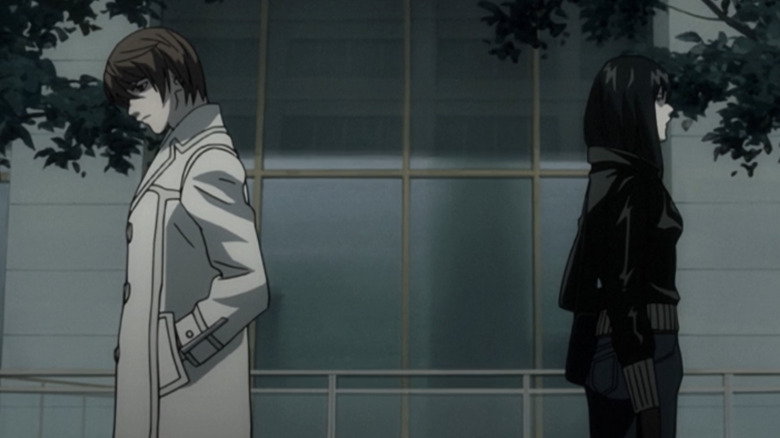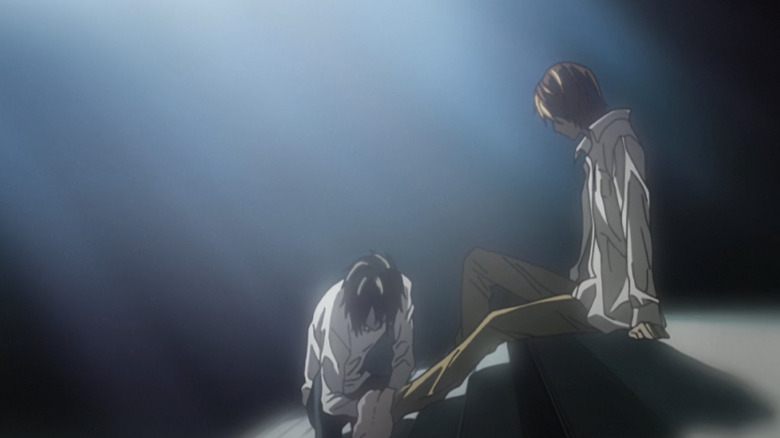The 14 Best Death Note Episodes, Ranked
This post contains spoilers for "Death Note."
It begins when a high-achieving high school student, Light Yagami, stumbles upon a mysterious notebook on his walk home from school. Inscribed on the front are the words "Death Note," and the first page lists a series of rules. The first line? "The human whose name is written in this notebook shall die."
After he gets a taste of the Death Note's supernatural power to kill, Light vows to murder every violent criminal on the planet in order to create a "perfect world." In the process, he becomes the living urban legend known as "Kira." However, these mysterious deaths attract the attention of L, the greatest detective on the planet. On top of all that, Light must also now deal with Ryuk, the capricious shinigami, or death god, who put the Death Note in his path in the first place.
"Death Note" is, in every sense of the word, fantastic. It's one of the best-selling manga of all time, and the anime adaptation is just as popular. Despite its controversial premise, "Death Note" provides an incredibly unique take on the crime thriller genre. If anyone were to ask me what an anime version of Michael Mann's "Heat" might look like, "Death Note" would be my first answer.
While you'll probably want to watch "Death Note" from the beginning, these are the 14 best episodes of the anime.
14. Episode 15: Wager
The cat-and-mouse game that makes up the bulk of "Death Note" is riddled with sudden turns. Just look at this episode, which is an excellent example of how thrilling the show can be, and how quickly the fates of its characters can change. "Wager" starts with Light planning to kill L, and ends not only with the task incomplete, but with Light in immediate danger of being discovered as Kira.
In "Wager," L visits Light at college. Misa soon arrives and learns L's real name, which is required to kill a person with the Death Note. When she leaves, Light calls her immediately to get the crucial info ... only to hear her phone ringing behind him. That's right: L pickpocketed Misa's phone. Misa is then taken into custody.
The key to wonderful reversals like this is that both L and Light are always thinking about the next turn of events and how to influence them. Every action that these two take is deliciously calculated — even mundane activities, like examining strands of hair collected as evidence, can lead to major plot twists.
13. Episode 12: Love
One of the most notable elements of "Death Note" is the way it introduces new characters. These debuts are almost always narratively clever; a few even make the introduction itself a potentially story-ending threat for Light Yagami. Episode 12 is the first such instance on this list. It won't be the last.
In "Love," the existence of a second Kira is revealed, and L makes plans with Light to trap them with a fake message from the real deal. Misa, the new Kira, takes the bait. She replies, saying that she "doesn't think he has the eyes." This sends Light into a stratospheric panic — she's saying too much, and L is too insightful to let such a significant clue pass him by.
The introduction of new characters is usually an exciting moment on "Death Note" because of how focused the show is on Light and L. Introducing characters who act on their own raises the stakes, complicates both characters' plans, and keeps the back-and-forth between the main duo from becoming monotonous.
12. Episode 36: 1:28
The second-to-last episode of "Death Note" is particularly special. In it, Light confronts L's legacy in order to decide once and for all which philosophy will prevail in a final, conclusive battle of wits.
The score for this episode is thrilling. As the Task Force enters the warehouse to meet Near, L's true successor, the music is unlike anything we've heard thus far. However, Mikami, Light's newest minion, has already arrived, and is furiously writing everyone's name but Light's in the Death Note. He then begins counting down the seconds until death. At the last second, Light begins to gloat: "Well, Near, looks like I win."
This episode is particularly interesting because it reveals who Light has become in L's absence, and puts his hubris on full display. While it is true that Light has had a god complex since the beginning, it isn't until this episode that he genuinely believes that he has reached some form of divinity. Still, some of Light's arrogance relates not to himself but to L, his greatest enemy and closest friend. He mocks Near as a mere imitator; I find it interesting that, after all this time has passed, Light is still thinking about L.
11. Episode 37: New World
The 40th second comes. Nobody dies. Caught, Light lets out a freakish laugh and says the truth out loud: He is Kira. After a struggle, Light ends up bleeding on the floor. His body is full of bullets; he's writhing in pain. Light heads outside, and the Task Force follows. Light remembers his past self as he runs helplessly, and realizes that maybe he was cursed after all. In the distance, Ryuk says a final farewell and writes Light's name in a Death Note.
There are many interesting takes on the ending of "Death Note." What I appreciate most, though, is the direct juxtaposition of who Light was at the beginning of the show versus what the Death Note turned him into. Had he not received the Death Note, Light could have continued living a regular life. As he's dying on a staircase, that's what he longs for. At this point, I think that Light realizes that the life he was living before the Death Note wasn't actually a lie. Now, however, he's faced with the brutal consequences of the lie he told himself: that he could transcend his own humanity. Many anime series that endure over more than one season struggle to pull off their endings, but the poignant purpose shines through in the "Death Note" finale.
10. Episode 4: Pursuit
In episode 4 of "Death Note," Light is on a bus with a date and an unknown agent. A criminal gets on the bus and holds the driver at gunpoint. Light openly plans to wrestle the gunman into submission, but the agent intervenes, quietly saying he'll take care of it. When Light questions this decision, the agent reveals his badge. After grabbing a piece of paper, Light drops on the ground and the criminal freaks out. Why? Because he can see Ryuk.
See, this entire predicament was planned. To create this scenario, Light needed to not only to consider precisely what to write in the Death Note, but also what actions he would need to take to make everything unfold correctly. It's a remarkable demonstration of how innovative Light can be, and how he's able to cleverly bend the Death Note's rules. It's also the first time that Light uses Ryuk, a literal death god, as an unwitting pawn in his plots. It isn't the last. I like this episode for the way it boldly flaunts Light's capabilities, especially because he spends most of his time on the series hiding from L's gaze.
9. Episode 24: Revival
At this point in the show, Light has relinquished his Death Note to avoid detection from L. As a result, he loses all memories of the Death Note. Here, however, Light is reunited with the Death Note, and he's ecstatic. Why? Because this means that he won.
Episode 4, "Light," demonstrated how capable Light is at planning ahead using information unavailable to L and the Task Force. However, that scheme is concocted and unfolds over the course of a single episode. In this case, Light planned nearly 10 episodes ahead for this moment. This was a long con that he deliberately made himself forget about. What makes this doubly impressive is that Light has the self-awareness to know that he would have joined the search for Kira if he had no knowledge of the Death Note.
There's an interesting narrative irony to this moment as well. This episode truly establishes that the evil Light is capable of is connected exclusively to the Death Note. Light is smart enough to know that relinquishing the book would make him a better person, and yet he sees his normal self as a tool to be used, and not something virtuous to aspire to.
8. Episode 8: Glare
Episode 8 contains a highlight of the series that I would be a fool not to include. In it, Ryuk reveals that he found 64 cameras in Light's room. Light enthusiastically opens a bag of chips that he grabbed from the kitchen, and finds a tiny television inside. Light then writes on a tiny scrap of the Death Note, using a pen inside the bag of potato chips. Then, with the confidence of a serial killer, Light takes a potato chip ... and eats it.
This episode is often playfully mocked for its over-the-top depiction of what is essentially a student studying and eating potato chips. However, in eating his chips, Light is actually accomplishing an incredibly impressive feat. Light has made L, the best investigator in the world, a first-hand witness to his alibi. He's found a way to use the Death Note while under constant surveillance, and the show pulls out every creative camera move in its arsenal to draw the most, ahem, flavor out of this seemingly benign moment. It's a fantastical episode that might be entirely unnecessary, but I think it's also too enjoyable to exclude from a list like this one.
7. Episode 17: Execution
Light's father, Chief Yagami, is driving, with Light and Misa in the back seat. He tells them that they are being transported to their execution. Yagami takes the kids to an empty field, pulls out the gun, and holds it to his son's head. He cocks the gun and pulls the trigger — and nobody dies. The bullet was a blank.
This episode is masterfully tense for not only the characters involved, but for the audience as well. Police Chief Yagami is arguably the most morally upstanding character on "Death Note," and he unquestionably loves his family. The very last thing any viewer would expect him to do is hold a gun to his son's head. And yet, not only does this happen in "Execution," but we learn that Light's father agreed to participate in this harrowing test willingly.
I like this episode because it effectively rounds out Chief Yagami as a character and provides a fascinating narrative paradox: Chief Yagami loves his son so much that he would risk Light's life to prove his innocence. It also has major implications for L. L is willing to make anyone do anything that's within the bounds of the law to get to the truth. Interestingly, he probably would have, too, if Light and Misa's memories were intact during this moment.
6. Episode 9: Encounter
Light gets into TO-OH University. He attends the entrance ceremony, and learns that he's been selected as the freshman representative alongside another new student, Hideki Ryuga. They give their speeches, and L says that he has an important piece of information to tell Light regarding the Kira case, as long as he's willing to keep it a secret. Light agrees.
L then directly tells Light that he's L.
The show enters a new phase at this moment. As a viewer, it definitely surprised me. Like Light, I was completely caught off-guard by L's bold move. This is a complete shift from the strategies that L has used before, which were primarily focused on maintaining his anonymity as he narrowed down the list of suspects. I enjoy this moment because it's definitely the opposite of what I suspected the investigator would do in this situation. and establishes L's willingness to use his own life as a pawn in this game of 4D chess. Light doesn't know who he's messing with — and until "Encounter," neither did I.
5. Episode 10: Doubt
Episode 10, "Doubt," opens with Light and L at the tennis court. They play a very dramatic match that essentially doubles as an interrogation, then go out for coffee. There, L decides to give Light a deductive reasoning test. When asked to decipher some notes, Light does so, but is told that he's incorrect. That's impossible, because he's Kira and he invented the code. L then puts a fake fourth note on the table and presses Light on why he didn't consider its existence.
Light never knows when he is going to be tested by L, because L is always suspicious. Very often, this leads to enjoyably unexpected situations that force Light into a corner, upping his paranoia. A vital piece of L's strategy involves taking actions that will send Kira into a panic and, possibly, lead to an accidental confession. It's always an absolute delight to watch Light internally explode as a result of these provocations, and it's interesting to see how Light's fear of L becomes a borderline insurmountable complication for his ultimate goals.
4. Episode 19: Matsuda
Episode 19 begins with a rookie mistake, ends with a faked death, and takes place over the course of just one day.
In it, Matsuda feels undervalued as a member of the Task Force and decides to act on his own. So, he stalks the executives through Kira's latest location, the Yotsuba Group building. As Matsuda leans against an office door, struggling to listen more deeply, it's opened by an assistant, and he flops right into the conference room. L now has to move heaven and earth to save Matsuda's life.
This episode is a masterclass in narrative escalation, and an unusual expression of situational comedy in an otherwise very serious show. A lot of the humor in "Death Note" consists of an occasional one-off line that isn't really to the story. Episode 19, though? It's an epic joke in itself.
This situation was entirely avoidable. However, I can't help but appreciate its inclusion, because it gives the audience a fun glimpse into how funny these characters can be when responding to unexpected problems. I also love how it's clever enough to accomplish this without diluting the high stakes of the overarching plot.
3. Episode 2: Confrontation
In episode 2, an international announcement from the ICPO begins playing on Light's TV, during which Lind L. Tailor bravely shows his face. Light responds by writing Tailor's name in the Death Note. Just as planned, L dies of a heart attack. An imposing letter "L" then appears on the screen. As it turns out, Lind L. Tailor is not L, and the real L directly tells Kira to kill him. Light helplessly stares at his television. "Well, Kira, it seems that you can't kill me after all," L taunts.
L then reveals that, even though the broadcast was purportedly shown internationally, it actually only aired in the Kanto region of Japan. It's episode 2, and L already knows where Kira lives. That is explosive. It's a revelation that grabs viewers by the lapels and straps them into the seat of a roller coaster. The purpose of the first episode is to introduce the Death Note and Light's motivations, and left me thinking it would be about how Light's killings would impact the world. I was under the impression that Light's challenges would come from numerous sources. This episode shatters that expectation. It lets the audience know that this show is not simply about an investigation; it's really a high-speed, high-stakes chase.
2. Episode 7: Overcast
"Overcast" begins with Light accepting that he has absolutely no choice but to eliminate Shoko Maki. She has figured out that Kira can control his victims' actions before death, and she is going to tell L. As Light has written in the death note, Maki's death is set to begin exactly at 1:15, but when the appointed time rolls around, nothing happens. Then, he remembers how Ryuk cackled every single time Maki's name was mentioned, and realizes that Maki is using an alias.
This entire episode then becomes a relentless struggle to discover this woman's name and get rid of her. In my opinion, this is the coolest "close call" in the entire series. Maki is the grieving lover of one of Light's victims who comes out of nowhere and almost single-handedly ruins him. Narratively, it's beautiful.
In a show that is all about strategic mental posturing, I think it's absolutely fascinating to have the main character be forced to contend with luck and coincidence. It's the only time in the show Light suggests the intervention of a god other than himself. This episode attempts to deconstruct the meaning of karma, whether it's real or not, and, if it is, how it might function. I think it really stands out as a result.
1. Episode 25: Silence
Episode 25 is a borderline religious experience, and deliberately so.
Standing on a rooftop in the rain, L asks Light, "From the moment you were born, has there ever been a point where you actually told the truth?" They head back inside. L wipes Light's feet and gives him a massage. Light wipes some of the leftover rain from L's hair. It's an unusually touching, quiet moment. Then, they head back into the main area. L is on the verge of cracking the case. However, as he is making the final move, he is killed by the Death Note. The deed is done.
This is my favorite episode of "Death Note." The tone is so tender that it feels like the show itself is mourning the death of L even as it happens. We see L at his most vulnerable, and the episode is graceful and poignant in a way that I would have never expected. Another important piece is the moment that Light and L share on the staircase. It shows that these two anomalous beings are ultimately human, and that underneath all of their posturing they admire one another. The uniquely toned emphasis on the complexity of this relationship expertly foreshadows how Light's story will end. Oddly, L is the one who grounded Light; it's only when L's absent that Light finally loses his footing. This episode quietly, softly hints at that major shift.
